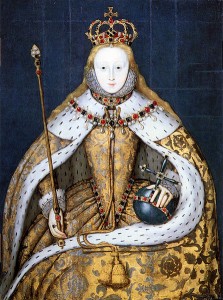 On 17th November 1558, following the death of Queen Mary I early that morning, Mary’s 25 year-old half sister Elizabeth was proclaimed queen at around noon at Whitehall by by the Houses of Lords and Commons who had been in session that morning.
On 17th November 1558, following the death of Queen Mary I early that morning, Mary’s 25 year-old half sister Elizabeth was proclaimed queen at around noon at Whitehall by by the Houses of Lords and Commons who had been in session that morning.
Sir Nicholas Throckmorton was dispatched to Hatfield to give Elizabeth the news and to give her Mary’s ring as proof of her death. According to tradition, Elizabeth was sitting reading under an old oak tree in the parkland around Hatfield Place when she received the news. On hearing of her accession, the daughter of Henry VIII and Anne Boleyn is said to have sunk to her knees and uttered in Latin what translates to “This is the Lord’s doing: it is marvellous in our eyes”, from Psalm 118.
Sir John Harington, Elizabeth I’s godson, writes of Elizabeth making the following speech on hearing the news:
“”My lords, the law of nature moveth me to sorrow for my sister; the burden that is fallen upon me maketh me amazed; and yet, considering I am God’s creature, ordained to obey His appointment, I will thereto yield, desiring from the bottom of my heart that I may have assistance of His grace to be the minister of His heavenly will in this office now committed to me. And as I am but one body naturally considered, though by His permission a body politic to govern, so I shall desire you all, my lords (chiefly you of the nobility, everyone in his degree and power), to be assistant to me, that I with my ruling and you with your service may make a good account to almighty God and leave some comfort to our posterity in earth. I mean to direct all my actions by good advice and counsel. And therefore, considering that divers of you be of the ancient nobility, having your beginnings and estates of my progenitors, kings of this realm, and thereby ought in honour to have the more natural care for maintaining of my estate and this commonwealth; some others have been of long experience in governance and enabled by my father of noble memory, my brother, and my late sister to bear office; the rest of you being upon special trust lately called to her service only and trust, for your service considered and rewarded; my meaning is to require of you all nothing more but faithful hearts in such service as from time to time shall be in your powers towards the preservation of me and this commonwealth. And for council and advice I shall accept you of my nobility, and such others of you the rest as in consultation I shall think meet and shortly appoint, to the which also, with their advice, I will join to their aid, and for ease of their burden, others meet for my service. And they which I shall not appoint, let them not think the same for any disability in them, but for that I do consider a multitude doth make rather discord and confusion than good counsel. And of my goodwill you shall not doubt, using yourselves as appertaineth to good and loving subjects.”
Historian David Starkey writes of how this speech, entitled “Words spoken by the Queen to the lords at her accession”, is normally assigned to the 20th November but that it is more likely to have been spoken on the 17th.
In this speech, Elizabeth makes various points:-
- She expresses her sorrow for Mary’s death
- She expresses her desire to do the best in the office to which she has been called by God
- She asks for the assistance of the nobility
- She thanks three groups: the pre-Tudor nobility, nobles who had been ennobled by her father, brother and sister, and those who had followed and advised Mary
- She makes it clear that there will be what Starkey calls “a heavy cull” and that she will only appoint those “I shall think meet”
- She consoles those who will not be appointed
It was the start of a new era, the reign of Gloriana.